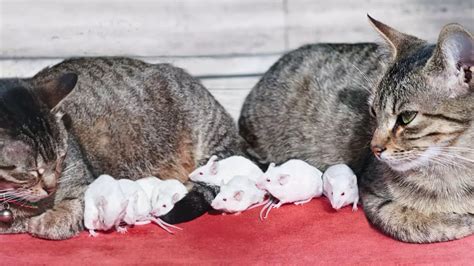If your cat has recently eaten a mouse, it’s understandable to be concerned about the potential risks and what you should do next. This article will provide a thorough overview of the subject, including the following:

- What are the risks of a cat eating a mouse?
- What should you do if your cat eats a mouse?
- How to prevent your cat from eating mice in the future
- Additional resources for further information
Risks of a Cat Eating a Mouse
The primary risks of a cat eating a mouse are:
- Toxoplasmosis: This is a parasitic infection that can be transmitted to cats through eating infected mice. Symptoms of toxoplasmosis in cats can include fever, lethargy, vomiting, and diarrhea. In severe cases, it can be fatal.
- Roundworms: These are intestinal parasites that can be transmitted to cats through eating infected mice. Symptoms of roundworms in cats can include weight loss, diarrhea, and vomiting.
- Tapeworms: These are long, flat parasites that can be transmitted to cats through eating infected mice. Symptoms of tapeworms in cats can include weight loss, diarrhea, and vomiting.
What to Do If Your Cat Eats a Mouse
If you believe your cat has eaten a mouse, it’s important to take the following steps:
- Monitor your cat for signs of illness. The symptoms of toxoplasmosis, roundworms, and tapeworms can take several days to develop. If you notice any of these symptoms, contact your veterinarian immediately.
- Contact your veterinarian. Even if your cat is not showing any signs of illness, it’s important to contact your veterinarian for advice. Your veterinarian may recommend testing your cat for toxoplasmosis, roundworms, and tapeworms.
- Follow your veterinarian’s instructions. Your veterinarian will provide you with instructions on how to treat your cat if they have any of these parasites. It’s important to follow these instructions carefully to ensure that your cat receives the proper care.
How to Prevent Your Cat From Eating Mice in the Future
There are several things you can do to prevent your cat from eating mice in the future, including:
- Keep your cat indoors. This is the most effective way to prevent your cat from eating mice.
- Feed your cat a high-quality diet. A well-nourished cat is less likely to hunt for mice.
- Provide your cat with plenty of toys and enrichment activities. This will help to keep your cat entertained and less likely to get bored and hunt for mice.
- Eliminate potential hiding places for mice. This includes sealing up any holes or cracks in your home, and keeping your yard free of debris.
Additional Resources
The following resources can provide you with additional information about the risks of cats eating mice and what to do if your cat eats a mouse:
- The American Veterinary Medical Association
- The Centers for Disease Control and Prevention
- The Humane Society of the United States
Conclusion
If your cat has eaten a mouse, it’s important to take the necessary steps to protect their health. By following the advice in this article, you can help to ensure that your cat remains healthy and happy.
